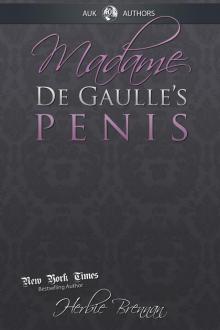- Home
- Herbie Brennan
Madame de Gaulle's Penis
Madame de Gaulle's Penis Read online
Title Page
MADAME DE GAULLE’S PENIS
a novel by
Herbie Brennan
Publisher Information
Madame De Gaulle’s Penis published in 2012 by
Andrews UK Limited
www.andrewsuk.com
This book is sold subject to the condition that it shall not, by way of trade or otherwise, be lent, resold, hired out or otherwise circulated without the publisher’s prior written consent in any form of binding or cover other than that in which it is published, and without a similar condition being imposed on the subsequent purchaser.
The characters and situations in this book are entirely imaginary and bear no relation to any real person or actual happening.
Copyright © 2012 Herbie Brennan
The right of Herbie Brennan to be identified as author of this book has been asserted in accordance with section 77 and 78 of the Copyrights Designs and Patents Act 1988.
Disclaimer
Not one word of this book is true, even where it refers by name to real people and places. It’s a novel, for God’s sake. Novels are fiction.
Chapter One
Ironically, I thought the de Gaulle interview would be the highlight of my career. It never occurred to me that since he’d screwed up half of Europe before his retirement, he was perfectly capable of screwing me up afterwards. I didn’t even use words like ‘screwed up’ then. Loose language was always frowned on by the BBC
The General was a lot taller than I expected. He actually had to bend slightly coming through the door of the studio. His wife, trailing a pace or two behind, looked like a midget, but I suppose this was the effect of contrast. They were flanked by Barclay Haslett, my producer, and his P.A., Laureen Dunn, a fearfully intense young woman who seemed to have the hots for politicians - even clapped-out retired old politicians like de Gaulle. Not that I thought of him in those terms, of course. I was playing the same game as the rest of them, and like the rest of them I believed it.
I was even wearing a suit for the occasion, a three-piece pinstripe by Chester Barrie that had cost me £84. (Incredible how little this seems nowadays, but in 1969 it was a fortune.) My wife Seline - I cringe to tell you all this now - had starched a shirt in delicate pink Egyptian Esbyline cotton and insisted I wear a carnation in my buttonhole. All for Mon Général. The interview was on radio and the listeners wouldn’t have cared if I was wearing a barrel.
So forward I went, smiling my professional smile, one manicured hand extended, noticing out of the corner of my eye that the control room - visible through a soundproof glass panel - was packed with the de Gaulle entourage. Barclay made the introductions.
“Mr President -” Barclay always had trouble keeping up with the news. “ - this is John Sinclair, one of our most experienced men. He will be conducting the interview.” He smiled, temporarily burying our differences. I smiled back, being big on hypocrisy in those days. De Gaulle smiled and took my proffered hand, shaking it briefly but firmly. Then he turned to his wife and said: “My dear, may I present to you Mr Sinclair who will be interviewing us.”
And his wife smiled and we shook hands and I couldn’t get away from her fast enough since I desperately wanted to zero in on the General. There’s no doubt I was an Al certified prick, deserving everything I got: which, as it happened, was considerable. But who sees himself as he really is? De Gaulle was big news. His British visit was big news. His retirement, while no longer big news, was still recent enough to be some sort of news, well worth searching investigation.
“Now, Mr Sinclair,” de Gaulle said, “what is it that you would like us to do?” He had taken charge already, which is what makes the difference between an international statesman and the common man, who exhibits a certain timidity when faced by the prospect of talking to an audience of millions.
“Perhaps you would like to sit down here, sir,” I suggested, not at all displeased that he was focusing his attention on me rather than Barclay. Producers tend to compensate for their inferiority complexes by hogging celebrities.
The General nodded, but did not move. Instead he asked with touching Gallic charm, “And my wife... ?”
There was only just the faintest hint of sharpness in his tone, but when you work on radio you develop an ear. So I corrected the mistake by pouring on the charm with Madame de Gaulle and fussing her into a seat beside the one earmarked for her husband. The layout of the studio was relatively simple and frankly cramped. All you had was a small, thickly carpeted, soundproofed room. In the middle was a sextagonal table with a centre mike hanging from the ceiling and subsidiary mikes at each of the places. I sat at one place. The de Gaulles sat side by side facing me. My positioning was such that I could see into the control room through the glass panel, which allowed me to ignore hand signals from the producer. In retaliation, I was forced to wear headphones which allowed him to give me verbal instructions - usually to cut something short since we were running out of time. A further reminder of the time was a large, plain clock on the studio wall. Apart from that, the only other item of interest was a three-part display panel beside the clock, which lit up with the words ‘Off the Air’... ‘Standby... and ‘On the Air’ as the occasion warranted. In case you missed it, you could take it you were off the air until the light on your microphone went red.
So it was and so it went. With our guests comfortably seated, I dismissed Barclay with a sweet smile and a murmured, “I can take it from here, Barclay, thank you.” Then, since all mike lights were green and the main panel wasn’t even on standby, I indulged in some light chatter to put the great man at ease. “And how are you enjoying London, sir?”
“I have always loved the city. I was here during the war, you know.”
I knew, but I only nodded encouragingly. The art of interview is to keep your mouth shut as much as possible.
“I have, of course, visited it since then, but somehow this time is different.”,
“A little more relaxed since you’ve left down the burdens of state?” I suggested sycophantically.
He fell for the oil, as they always do, and said expansively, “Certainly more relaxed, Mr Sinclair. Certainly that. I have had time to view my dummy.”
I blinked, wondering what the hell he was talking about. The term dummy in England had a limited range of meanings at the time. It could be what the Americans coyly call a soother, the fake rubber nipple you shove in babies’ mouths to shut them up. Or it could be a deaf-mute. It might even be, by association with our American cousins, a stupid person. None of these sounded even remotely appropriate.
“Do you know this is the first time I have actually seen it?”
“Really?” I said brightly. It was not the first time I’d held up my end of a conversation without having the least idea what the other person was talking about, but it was dangerous to let it drift too far with someone of importance. I coughed discreetly. “And, ah, exactly where did you... ah... see it?”
De Gaulle frowned. “At the Madame’s, of course.”
Had he visited a brothel? Like most Englishmen, I was aware the French were sex mad, but was he likely to admit it in front of his wife? Besides, what sort of dummy would you find in a brothel? An inflatable doll was one possibility, but surely it would have made more economic sense to buy than rent? My mind returned to the baby’s soother. Did the General compensate for his military career by pretending to be a baby while some tart dressed up as a nanny and bounced him on her knee? I was having trouble picturing it.
“Madame Tussaud’s,” murmured Madame de Gaulle, who may well have read confusion on my face.<
br />
“Ah, your waxwork!” I exclaimed without even bothering to give her a grateful glance.
“Just so,” de Gaulle nodded.
The asinine quality of the conversation did not disturb me in the least. Everybody talks nonsense before an interview. The trick is to stop them talking nonsense when the red light goes on. Which at that precise moment was probably not too far away since my earphones, lying on the table in front of me, had started to click audibly. I smiled apologetically at the General - I smiled a lot then, even when I didn’t feel like it - picked them up and put them on.
In my ear, Barclay’s voice asked sourly, “Are you ready?”
I gave him a brief nod through the panel and he turned away to talk to one of the engineers. I only heard the word “Tony -” before my earphones went dead again. Almost at once the standby light came on. Albert Foster, the chief engineer, said briskly through my earphones: “Two minutes, John.”
I was smiling again., Mr BBC Smoothie to the tips of my patent leather. “I wonder, sir, if you feel ready to begin?” I was still ignoring Madame de Gaulle, despite the fact she was theoretically part of the interview. I figured she must be used to playing second fiddle to her husband by now.
“Quite ready,” Charles said. He was also ignoring Madame, having done his little bit for old world courtesy when he slyly pointed out my boob over the seating arrangements.
“I’m sure you must know all there is to know about this by now,” I told him, “but I’ll just run over the sequence quickly. The microphones in front of you are dead until the red light comes on. After that, they will stay live throughout the interview. This is only a recording, of course, so if anything should go wrong, or if there’s anything you’d like to rephrase, we can always do a second take and edit in. The interview is scheduled for our lunch-time news programme so I won’t be recording any introduction - we’ll come straight in with the first question, which will be to you, General. After that we’ll see how it goes.”
“Yes,” de Gaulle said.
In my ear, Barclay’s voice said “Ten seconds” as the standby light blinked once. Madame de Gaulle looked as if she was about to say something, but I waved her brusquely into silence, murmuring “Just starting.” I made the countdown on the clock and got it wrong by a full second. The red lights came on and we were on the air; or at least on recording tape.
“General de Gaulle,” I said firmly, “have you any regrets about retiring from the political scene at what is, after all, a crucial era in European history?”
“To some extent”’ de Gaulle said smoothly, “all eras in European history have been crucial, so if that was to be the criterion, one might never manage to retire at all. But you are, of course, correct in your suggestion: I am pained to have to leave so much undone.”
Nice start, I thought, hitting just the right note. The killer interview had never been popular with the BBC - they left that sort of thing to the Americans. Our way was to make everything sound like a civilized discussion over tea. “And yet,” I said, “you have probably done more for Europe than any other statesman in the present century. Would you agree with that evaluation? And if so, what would you say has been your greatest single achievement?”
“Oh, ho, ho,” de Gaulle said, sounding for all the world like Maurice Chevalier. “I can hardly to be expected to agree with such a flattering assessment.” All the same he loved it - I could see that from his face. They were all the same, these old political farts. Power mad, publicity mad, and so stupidly susceptible to flattery they’d swallow anything. I watched him with every indication of intense interest as he went on, “It was my duty and my pleasure to serve France and my good fortune that in serving France I could also serve the great continent of Europe. My greatest single achievement? Who knows what may be a man’s greatest achievement? Such things are not judged in a man’s lifetime, sometimes not at all. But perhaps I could tell you my most satisfying achievement. That was, without doubt, helping lay the foundations of the Common Market, for in the Common Market lies the hope of a united Europe.”
All good, solid bullshit and no doubt the listeners would lap it up with their lunch time snacks. The programme, World at One , was introduced by Bill Hardcastle, whose breathless delivery gave even the weather forecast an air of crisis. I purposely pitched my own style low key to relieve the tension. It was an interesting ploy and one that seemed to work. Many another radio journalist had broken his head against stone trying to beat old Bill at his own game. None of them ever achieved his crackerjack pace and most of them sounded silly trying. By providing a bland contrast, I was carving my own niche on the airwaves, building up my own following among the listeners. Or so I told myself.
“Let’s take up that point,” I said easily, knowing that nothing would please the old windbag better. “In view of the current history of disputes among Common Market members, can you still believe a united Europe is a practical reality?”
This was not, as you might think, questing incisive journalism. It was what is known in the business as a ‘feed question’ producing a wholly predictable response. Politicians love them, since it allows them to spew propaganda in all directions.
“Well,” said de Gaulle, who knew a feed question when he heard one, even when it hit him in a foreign language, “there will always be disputes among member nations. But the important point is the way in which these disputes are now settled. I am sure all but your youngest listeners will remember the horror of the Second World War when...”
I let him ramble without really listening. I’d heard the speech, in content if not in form, a dozen times or more from various pro-Market politicians both in Britain and on the Continent. So, apparently, had Barclay, who was furiously urging me to ‘liven it up’ through my earphones. My bland style was one of those points on which we disagreed - he violently, me blandly. I ignored him, there being nothing else you can do since you can’t argue back during a recording session. Besides, while the General’s voice droned on and on, I had become aware that Madame de Gaulle was glaring at me.
I found the development strangely disconcerting. Admittedly, I was allowing the old boy to hog the limelight, but she must have been well accustomed to that by now.
“Cut him off,” Barclay’s voice ordered in my car.
I ignored that too. I had been ignoring Barelay’s directing quite a lot lately, partly through spite and partly through a tendency to daydream whenever one of my interviewees took off at a gallop. To protect myself from Madame de Gaulle’s glare, I lapsed into such a daydream now. In it, through machinations not entirely clear to me, I had become what de Gaulle himself must have dreamed of at one time: supreme dictator of the planet. I was not a particularly imaginative dictator, for like potentates of old, I used my power for personal gain. My clothes were cloth of gold, my surroundings luxurious. But most important of all, I ran a massive harem of very young, very pretty women who spent their days - and most of their nights - naked.
A physical reaction to the thought began to manifest, so that I pulled myself together hurriedly.
“You’ve let him run on too long!” Barclay’s voice was hissing furiously in my ear. “We’ve only got a seven-minute spot and you’re supposed to bring in his wife as well! Cut him off!”
It was easier said than done, especially for a bland interviewer like myself. The General was now in full flight. He’d given us his reminiscences of the war, including some intriguing sidelights on the character of Churchill and was now predicting the future political development of Europe with all the enthusiasm of Nostradamus.
While waiting for some sort of natural break in the flow, I filled in time by wondering about my tendency to daydream. It was a comparatively recent development, with the strong erotic element more recent still. As a dabbler in the principles of psycho-analysis - I believed implicitly in so many fashionable things then - I put it down to the cre
eping approach of my fortieth year with its disturbing hints of approaching male menopause and the fourteen year itch. It was reassuring to think I was setting up such orthodox compensatory mechanisms within my psyche. They would, I felt, provide a safety valve when the emotional pressure was really on.
De Gaulle paused for breath and I shot in like a ferret. “An interesting concept, General, but let me turn now to your wife for a moment -” I literally did turn towards her, giving her the benefit of my smoothest smile yet to make up for ignoring her so long. In my experience women, even elderly women, will forgive you anything if you smile at them smoothly enough. At least, in my innocence, that was my belief then. “Madame de Gaulle,” I went on, casting about for some suitably innocuous question to ask her, “now that your great husband has retired from office, is there any one thing that you are now looking forward to? Any one thing that was denied you because of the pressure of his political work?”
And Madame de Gaulle replied with crystal clarity and not a hint of hesitations “Yes, Mr Sinclair - a penis.”
I was so stunned I couldn’t speak. Through the glass panel, I saw the engineers frozen in ludicrous expressions of shock. “Jesus God!” said Barclay in my ear, the first time I’d ever heard him blaspheme.
And then General de Gaulle was leaning forward, a solicitous look on his face, saying kindly, “I think, my dear, the pronunciation is ’appiness.”
At which point I committed the one unforgivable sin for a BBC interviewer. I sniggered.
Chapter Two
I drove home to suburbia where I owned a decorative, pretentious suburban house, worth £28,000 mortgaged to the hilt, and an equally decorate although less pretentious wife, as yet unmortgaged and named Seline. She waved to me from the living room window as I pulled into the drive.
Should you ever chance to meet Seline (which is entirely possible since I no longer have the slightest idea where she might be) you could be tempted to wonder why I ever bothered fantasising about naked women. She was a perfect physical specimen with long, gold-red hair, magnificent body and flawless features: a description in no way exaggerated. With all this, we had managed to develop a sexual problem - which is to say I had managed to develop a sexual problem. Seline considered herself uninhibited and proved it as often as was necessary by doing anything I asked in the bedroom. But only when I asked. She would initiate nothing - unless, of course, I asked her to initiate something. She coupled calmly. She had no trouble achieving orgasm, a fact that reinforced her self-image as an uninhibited woman, but dammit she even came calmly . It was the calm that was killing me. After nearly fourteen years, I felt I was living with one of those inflatable plastic dolls they give Arctic explorers.

 Through the Wardrobe
Through the Wardrobe The Faeman Quest fw-5
The Faeman Quest fw-5 Faerie Lord
Faerie Lord Madame de Gaulle's Penis
Madame de Gaulle's Penis Faerie Lord fw-4
Faerie Lord fw-4 The Secret Prophecy
The Secret Prophecy Faerie Wars
Faerie Wars Ruler of the Realm
Ruler of the Realm GreekQuest
GreekQuest The Faeman Quest
The Faeman Quest The Purple Emperor
The Purple Emperor The Purple Emperor fw-2
The Purple Emperor fw-2 RomanQuest
RomanQuest The Doomsday Box
The Doomsday Box Ruler of the Realm fw-3
Ruler of the Realm fw-3 Faerie Wars fw-1
Faerie Wars fw-1